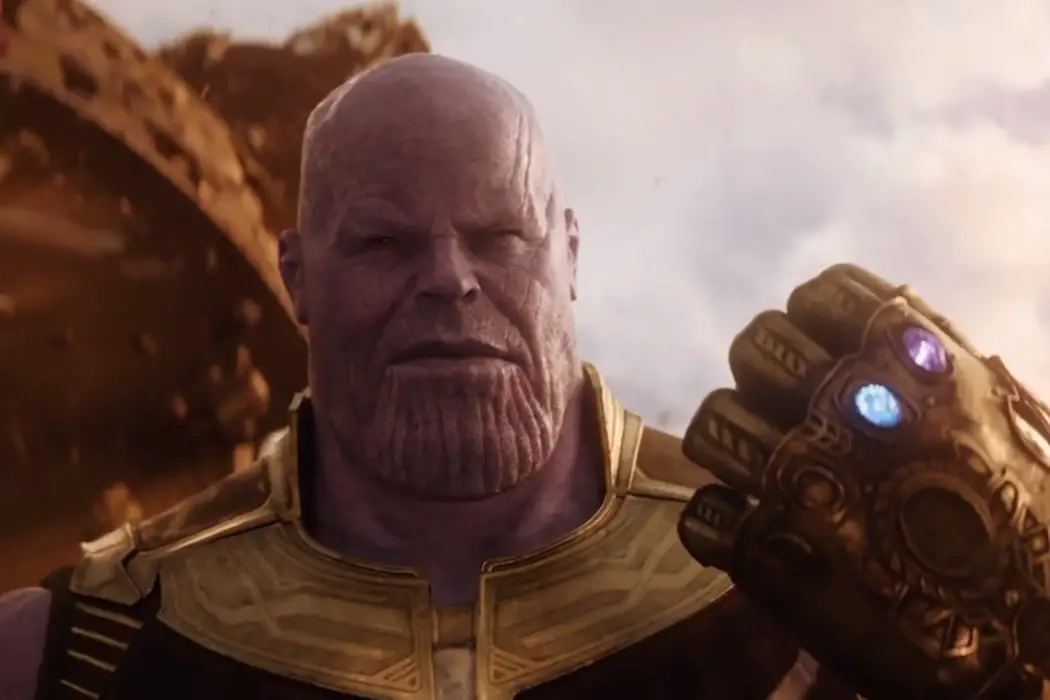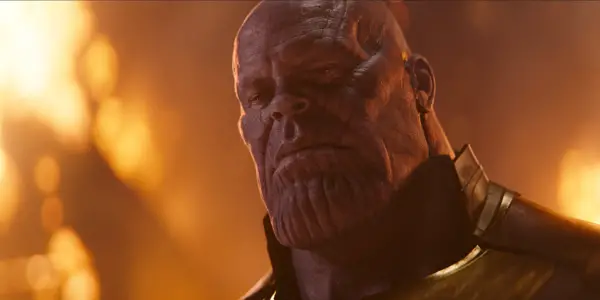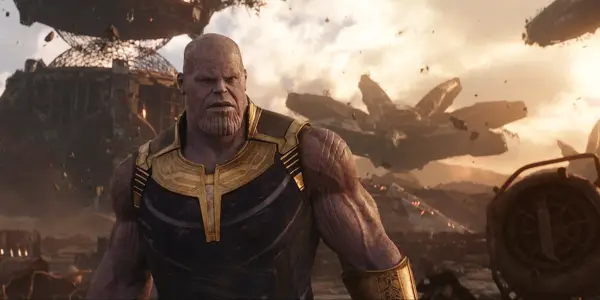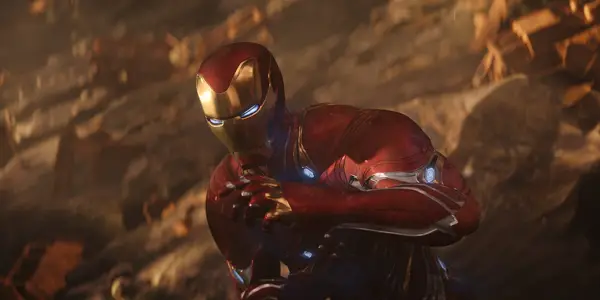Marvel’s Big Bad: How Thanos Is A Dark Reflection Of Blockbuster Heroism

Jack is a writer working in London, spending whatever time…
A lot has happened in the eight years since Thanos made his big screen debut in The Avengers. While the mid-credits scene was essentially an ingenious way to keep an audience invested in a vaguely-defined future release, it was also one of the most memorable and bold moments in blockbuster cinema – a thrilling mystery to close a world-changing event movie. Thanos’ smile promised something greater to come, but his central role in Avengers: Infinity War this year gave us more than we anticipated.
Following a streak of well-written villains from Marvel Studios’ rapidly expanding cinematic universe – with Ego and Killmonger leaving the likes of Malekith and Whiplash in the dust – as well as his own prolonged build-up across multiple movies, Thanos had plenty to live up to. Yet rather than give what comics fans were expecting – a mad nihilist hopelessly seeking the approval of the physical embodiment of death – we got something a little more human.
That’s not to say that there is anything humane about Thanos’ penchant for genocide, but his perverse logic hits close to home in a number of ways. In the weeks following the release of Infinity War, audiences have been taken aback by his motivations, and some have even expressed sympathy for the mad titan’s journey. Articles titled ‘Is Thanos right?’ have started to circulate, believe it or not. There is a level of this which is just the hot take of the minute, but while many wouldn’t agree with the character, there is something familiar about his methodology.
Thanos: The Reluctant Villain
Thanos takes little pleasure in what he does. He is simply righting the wrongs of an overcrowded universe, seeking to wipe out half to save the remainder. He offered this as a solution to save his own world, and was met with derision from his peers. As he feared, the world collapsed under its own weight, and he sought never to let it happen again. Any resistance from others or his own self-doubt from then on were merely obstacles on the path to true salvation.

In one exchange with his adopted daughter, Gamora, she refuses to validate his belief that his actions will save anything. When told he “doesn’t know that” it will work, he replies that he is “the only one who knows it,” clarifying that he is the only one with “the will” to follow through. He clings to this so-called knowledge, as the end of his own planet ‘confirmed’ his theory, but he refuses to listen to any contradicting perspective. He alone knows what is right for everyone else, so he doesn’t need to ask permission.
Beyond being a proponent of Malthusianism, Thanos reflects the more cynical aspects of the heroes of modern blockbusters. The ‘mad titan’ tenderly explains that he is only hoping to “rest, and watch the sun rise on a grateful universe” once all is said and done, even if he must be monstrous in order to get there.
Cursed With Knowledge
Thanos joins the ranks of a long line of blockbuster protagonists who have been, as critic Bob Chipman put it, “the suffering martyr hero whose noblest act is accepting not being appreciated in his time”. By giving this kind of Byronic philosophy to its villain, Infinity War criticises a familiar ‘heroic’ narrative we have seen a lot lately, even in previous Marvel movies.
A fitting example is to return to The Dark Knight, whose protagonist willingly takes on the hatred of others for a greater purpose, serving as a “silent guardian” rather than a beloved hero. These problems often come up in superhero narratives, who struggle to reconcile the fact that their heroes are still technically vigilantes taking the law into their own hands. However, what is perhaps a worthy lesson is lost in films in which it is poorly implemented, and is arguably too prolific in these stories.

Thanos is rarely enraged or hysterical; he simply states his belief as reality. He even gives thoughtful consideration to the world around him and the consequences of his own mission. Yet these thoughts are limited, stuck in the quagmire of his own myopic thinking. Self-centred, solipsistic thinking is something we frequently see all too often in (often male) blockbuster protagonists. A clear recent example is Zack Snyder’s interpretation of Superman, who faces hostility from the public for his intervention – but other heroes fit the bill too.
Thanos is stuck in this mode of thinking, and as the clearest protagonist of Infinity War, the heroes of the tale are obstacles for him to overcome on the way to victory. Aside from his central role in the narrative, his wording is also familiar, pointing back to the heroes we’ve been following all these years.
A Dark Reflection
In Iron Man 2, Tony Stark insists on keeping his technology to himself, because he is Iron Man. He gradually changes over the course of his other cinematic appearances, but this self-centred thinking rears its head again in other forms. In Iron Man 3 and Avengers: Age of Ultron he recklessly experiments with technology to prepare for the coming apocalypse. He alone knows what’s to come, so it’s his job to protect the world, envisioning Ultron as a “suit of armour around the world” before his creation nearly blows it all to hell.
In Captain America: Civil War, we see Steve Rogers remain certain in his belief that he is doing the right thing, even when doubts cloud his mind. He follows Peggy Carter’s advice to “plant yourself like a tree” and refuse to move, even if the whole world is asking. The main difference, of course, is that we can forgive their mistakes and sympathise with their flaws more easily. Thanos’ methods are clearly more violent, more destructive, and are fuelled by madness. Yet he is still seeking to protect the world, while getting lost in his own limited perspective.
In a surprising turn, we eventually see Tony and Thanos as two sides of the same coin. As Richard Newby wrote in his article for the Hollywood Reporter, they are both seeking to “avoid their visions of the future” no matter the cost. “When Thanos reveals that he knows exactly who Stark is during Infinity War’s third act, the only Earthling he refers to by name,” Newby writes, “he tells Iron Man that he is ‘not the only one burdened with knowledge.’”

Thanos is setting things right, just as Tony Stark has been searching to. Similar to how Guardians of the Galaxy Vol. 2’s villain showed its hero the dark path his egotistical behavior may lead down, Tony is faced with a nightmarish version of his own destructive impulse to protect his world. This further contrasts with the best aspects of the heroes of the story, their flaws overcome by their altruism. Each of them are self-sacrificial while refusing to put anyone else in harm’s way for their gain. Or, as Cap puts it, “we don’t trade lives”.
Marvel Studios have responded to their missteps in the past, and even lampshade common flaws to evade further criticism at times. In this case, however, their villain is a condemnation of the ‘cursed saviour’ archetype we have become all too familiar with. Thanos shows us the dark side of characters both inside and outside Marvel’s sandbox, and is even gifted the happy ending usually reserved for them.
Do you agree or disagree with this reading? And where do you think Avengers 4 can take the character? Please share your thoughts in the comments!
Does content like this matter to you?
Become a Member and support film journalism. Unlock access to all of Film Inquiry`s great articles. Join a community of like-minded readers who are passionate about cinema - get access to our private members Network, give back to independent filmmakers, and more.
Jack is a writer working in London, spending whatever time he has left over watching, over-analyising, and talking about movies.













